- Home
- Muriel Spark
The Complete Short Stories Page 19
The Complete Short Stories Read online
Page 19
‘That is the Couch,’ says the girl-student. ‘Yes, the original Couch.’ The couch is large, floppy and soft. One could go to sleep forever in it, sinking deeper and deeper.
‘And this is the waiting-room.’
‘Ah, the waiting-room,’ says the young man.
‘Is it haunted?’ says the woman, touching one of the red plush chairs lined up against the wall, themselves waiting for something.
‘Hunted?’ says the puzzled girl.
‘No, haunted. Ghosts.’
‘No,’ says the young woman, looking behind her in sharp surprise, for the man has left abruptly, and is already outside the door of the flat. When she turns back to the woman she is amazed to find nobody there.
At the family home of Louis Pasteur the bacteriologist at Arbois, in the rainy Jura, she is there and so is he. ‘This was the dining table. This is the board where he carved. What rain! — will it never stop? You would like to see the laboratory, Madame, Monsieur, this way.’ It is taken for granted they are a couple. The laboratory is scrubbed but somehow dusty, and a few old books are lying about realistically: ‘… his researches into organisms and fermentations.
‘Few people,’ says the young man, in lucid but foreign French, ‘realize that pasteurized milk comes from Pasteur.’
‘True,’ says the guide.
The couple leave together. Outside in the rain she says, ‘It’s time for you to stop following me.
‘I’m not following you,’ he says, ‘I’m following our ambition. It’s for you to go back where you came from. It was you who broke away.
‘There is no contract,’ she says. ‘No pledge. It was you who provoked the rift. We never had a marriage that you could call a marriage. As I’ve told you, I have always intended to open Father’s house to the public after Father’s death.’
‘You’ll never do it,’ he says. ‘Not without me. I’m part of the ambition. I have to go on.
‘You’re the ghost of an ambition,’ she says.
‘So are you, the ghost of a dream and a plan.’
He gets into his car and drives off leaving her in the wet, old street.
Dora opened the door of her father’s study and closed it again. It was two years since he died. Her new young man was the third in the series and, like his two predecessors, his enthusiasm for helping to put the papers in order and setting up the house as a museum, had waned or perhaps was never there. But unlike the others he has had a good effect on Dora. This young man was in the wholesale fashion business; his attempts to smarten up Dora’s appearance had been successful. In her fifties Dora looked healthy for the first time in her life. His devotion to her, or rather, his quite eccentric passion, always did wonders for her morale, as she herself put it.
‘Apart from being Henry Castlemaine’s daughter, what is there in me for you?’ she once asked the new young man.
‘You’re fascinating by yourself.’
It was, in a way, all she wanted to hear or know from him. The very next day she had telephoned to Ben. A woman’s voice answered the phone, a silly voice. ‘Who’s speaking?’ — ‘His wife.’ — ‘Oh, wife.’ — ‘Yes, wife.’ (Voice off ‘Ben, it’s for you. She says she’s your wife.’) — A pause and Ben is on the phone. ‘Yes, Dora, what do you want?’ — ‘Lionel and I have to make a decision about Father’s papers. I think you could be helpful.’ — ‘Who’s Lionel?’ — ‘My friend.’ — ‘I thought he was Tim.’ — ‘No, Tim was last year. Anyway…’ — ‘I’ll come round one day.’ — ‘Better make it soon.’ — ‘Some time in the next couple of weeks, I can’t manage sooner.
She is appalled to see him at the Brontës house of doom and dread, at Haworth in Yorkshire.
‘This is where they walked up and down at night, after dinner, here in this dining-room, planning the future —’
Outside, in the graveyard among the tombstones, there by Emily Brontës grave, she turns and says,
‘Stop following me.’
A small group of American visitors are watching them. They see a neurotic-looking woman in her mid-forties apparently trying to shake off a bewildered man in his late twenties or early thirties, both slightly outmoded in their appearance.
‘People are looking at us,’ he says.
‘It is my one hope,’ she says, ‘that we should open the house for Father. I’ve been round so many houses. They are all so bleak. Museums have no heart.’
‘Stop haunting them,’ he says. ‘That’s what I’ve come to tell you.’
‘Then you’ll be free, is that it?’
‘Don’t tell me,’ he says, ‘that you’re free, wandering around in this timelessness, as you do.’
They walk away, he to his car and she to nowhere. The American group are already standing before the solemn Brontë graves, reading the inscriptions.
It is at Lamb House, Rye, in East Sussex that the ghosts of their ambition finally reach a decision.
‘Would you like to sign the book?’ says the curator. ‘This is where James received his visitors; yes, it is rather small, quite poky; yes, indeed with his bulk he must have found it quite cramped. But upstairs —’
Out in the garden beside the graves of Henry James’s dogs Ben says,
‘I don’t know how you could bear to open your old home to the public. It’s so charming as it is.’
‘If it wasn’t for Father I would feel the same,’ Dora says. ‘But Father’s ambition was always for his fame to be perpetuated, for ever and ever, it seems, elongated, on and on into the future.
‘The future has arrived,’ he says, ‘and you’ve done nothing about it but sit around drinking with your young men, thinking of your father.’
‘And what have you been doing?’
‘Sitting around drinking with my girls, thinking of your father.
‘To hell with Father,’ she says.
Dora opened the door.
‘Lionel was desolate,’ she said. ‘I was a bit sad myself, for he was the best of the lot. But he knew he had to go.’
‘You’ve got a new haircut,’ he said.
‘Have you come for Father, his papers?’
‘No, I’ve come for you.
She led the way upstairs in the new freedom of her trousers, and opened the door to the hopeless study, with its piles of archives going back to 1890 or worse.
‘I suppose we should give them to a university,’ she said.
‘We would never be free,’ he said. ‘Those ghosts, those ghosts, would never let us go. Letters from students, letters from scholars. It would be the same old industry.’
They lit a bonfire in the garden that night. It took them many hours to burn all the Castlemaine papers. But they sat around drinking in the back wash-house, watching the flames curl round the papers and going out every now and again to feed the fire with a new armful, until they were all consumed.
The Dragon
I was standing talking at a cocktail party when I was saddened to see that everybody formed a forest. I felt defeated. The Dragon had taken over.
No sooner did I feel this, than I decided it was only a temporary defeat, for that is what I am like. I didn’t see then how I could possibly do it, but certainly, I decided, I was going to stop the Dragon. The party was people again. I picked up the conversation at the point where a man in the group was talking. He was good-looking, about sixty. ‘My address book,’ he was saying, ‘is becoming like a necropolis, so many people dying every month, this friend, that friend. You have to draw a line through their names. It’s very sad.’
‘I always use pencil,’ said a lady, a little younger, ‘then when people pass on I can rub them out.’
We were in a shady part of the garden. It was six o’clock on a hot evening in the north of Italy. It was my garden, my party. The Dragon came oozing through the foliage. She was holding her drink, a Pimm’s No. 1, and was followed by a tall, strikingly handsome truck-driver whom she had brought along to the party on the spur of the moment. To her dismay, discernible only
to myself, he was a genial, easy-mannered young man, rather amused to be taking half-an-hour off the job with his truck parked outside the gate. I knew very well that when she had picked him up at the bar across the street she had hoped he would be an embarrassment, a nuisance.
Oh, the Dragon! Dragon was what it was her job to be. She had been highly and pressingly recommended by one of my clients, the widow of a well-known dramatist. It didn’t occur to me, then, that the vertiginous blurb that was written to me about the girl was in fact so excessive as to be suspicious. Perhaps I did feel uneasy about the eulogies that came over the telephone, and the letters which the widow wrote to me from Gstaad about the Dragon and her virtues as such. Perhaps I did. But, as often when I want to believe something enough because I am in need of help, I didn’t listen to the small inner voice which said, Something is wrong, or which said, Be careful. I was optimistic and enthusiastic.
I was first and foremost a needlewoman. I have been called a couturier, a dressmaker, a designer. But it was my fascination with the needle and thread that earned me my reputation. I could have gone into big business, I could have merged with any of the world’s famous houses of haute couture. But I would have none of that. I preferred to keep my own exclusive and small clientele. It wasn’t everybody I would sew for.
When I left school at the beginning of the sixties there were two things I could do well. One was write a good letter in fine calligraphy, and the other was sew, by hand, with every stitch perfect. I worked as a seamstress, in the alterations department of a London store. This taught me a lot, but it didn’t satisfy me. At home, I started making my own clothes. I had learned at my evening classes how to make an individual working dummy for each client. I was very careful about this, and I practised on my grandmother with whom I lived. You cut a length of buckram into a body-shape and sew your lady into it over the minimum of underwear. I did this with my grandmother, basting the buckram on her body with only an exact inch to spare. She thought she would never get out of it again. Then, I sit it up the front with my scissors, sewed it up again the exact one-inch seam. When I had perfected the sewing on the buckram with even, small, back-stitching I filled the shape with fine-teased raw wool. There was my grandmother’s perfect shape to set on my stand. Some dressmakers use synthetic fabrics, if they still employ this process, but I wouldn’t touch them.
I made my grandmother a dress she was proud of to the day she died. It was velvet lined with silk, every inside-seam edged with narrow lace, both dress and lining. Nobody could see how beautifully it was finished inside. I have always stitched lace to my inside seams. Even if nobody ever saw the reverse side, my clients were the sort of women who are satisfied with the knowledge that they are beautifully dressed in garments made by hand and edged inside with very narrow lace, even when a silk lining hides the whip-stitched lace-edged seams. Hem-stitch, back-stitch, cross-stitch, slip-stitch, buttonhole-stitch — I can do them to perfection. No sewing machine has ever stood in my workshop. You might say it was my obsession to turn out a hand-made dress. My clients would say, ‘Do you mean that you even do the long seams by hand?’
‘Everything by hand,’ I replied. It’s been the secret of my success. You would be surprised at the demand for dresses and blouses and skirts and underwear all made by hand — I’ve accomplished entire trousseaux for clients who were prepared to give me time and pay the price.
A long time has passed since I made my grandmother’s dress, and since I set up on my own. My reputation as a superb seamstress was growing all the time, so that I no longer made clothes from paper patterns but employed my own men as cutters and designers. For cutting and designing you can’t beat a man; and the clients prefer them, too. The cutters and designers have come and gone over the years. I never married any of them although I came near to doing so very often. Something within me told me not to make a permanent life with any of the cutters and designers. Fashions change so much from season to season, year to year. Cutters and designers often get stuck in a certain period, and never move on; their best work is over. Needleworkers, on the other hand, never go out of date, and I was always a needlewoman with a difference. There is a big difference between the seams that are right for velvet and those for chiffon, and I have devised ways of sewing a lace dress where you wouldn’t know there was any seam at all. Lately I got my needles from Frankfurt, and my threads from London. My speciality was in the textiles that I obtained from all over the world.
So I had come to Como for silk, and was already fairly comfortably placed with my exclusive clientele. Like my textiles, they came from all parts of the world, even the wives of ambassadors from Eastern Europe. I saw a lovely house for sale on the shores of Lake Como and decided to settle there, and make a new workshop.
Now I was so well known for my hand-made dresses that I had to have some sort of protection. It takes a long time to make one hand-made evening dress or wedding-gown, so I couldn’t possibly answer the telephone to all the millionairesses and their secretaries, who wanted me to work for them. Ordinary maids and au pair helpers were very weak, and easily bribed. They would let people in or call me to the phone just when I was stitching a circular piece or a corner — very much precision-work. My temperament wouldn’t stand it. At the same time, I had learned over the years that the more you discourage your prospective clients the more they want your work, and the higher the price they are prepared to pay.
I decided to take on a Dragon, whose job it was to keep new clients at a distance, to tell them that they must write for an appointment; and she was to be very firm about this. Her other job was to look after the files of all my clients of the past, so that my business could go forward in good order, with that personal touch of remembering small items when the client finally succeeded in making an appointment. At this time I had a brilliant cutter called Daniele; he couldn’t design originals, but that is a small matter; Daniele could copy and adapt. I would advise him a little — which materials to cut on the bias and which to cut, for instance, with the patterns not matching at the seams, to make an intriguing change. I usually did the fittings and pinnings myself, because I have that very exact eye. Daniele was well-paid. He was inclined to be arrogant; he felt the traditional couture business, where the designers employ the cutters and seamstresses, was the true thing, and that my method was the wrong way round. But I soon let him know how to mind his business, and the pay kept him quiet.
I started to interview Dragons. A sewing assistant, I explained, was out of the question for me. All the more did I need protection, and time, long stretches of time all to myself. Every stitch had to be perfect, I explained, small and perfect. Even the basting and tacking stitches, which later had to be drawn out, had to be done by me, or I could not sleep at night. Sometimes, to make an elaborate dress, I needed two clear months, working on that one dress alone. With embroidery, I needed three or four months. All this I explained to the candidates for the job. There were eight. I brought them out from England to be interviewed on the spot where the job was offered. A frightened bunch, with one exception. The others were glad to get away after the interview and profit by their trip to Italy to go and see the sights and have a good time. The eighth looked more suspicious than afraid while I explained what the job was to be. She frowned a lot. Emily Butler. Tall, skinny, with her top teeth protruding, and a lot of red hair. She understood a little Italian and spoke French, as indeed had the other girls whom I’d brought out to be interviewed, otherwise I wouldn’t have brought them. But Emily: I thought she would make a good Dragon. She was to keep everybody away from me except an approved short list of clients, or people highly recommended by the clients. Even then, I was never to be called to the telephone. The client must either write or leave a number for me to call back at my leisure. Emily had brought an additional good reference from an opera singer she had worked for; she seemed to understand what was wanted. I remembered having heard somewhere that women with protruding teeth are very attractive to men, but I didn’t see
that this was a factor that mattered, anyway. In fact, what happened had nothing to do with Emily’s teeth.
The Dragon was a marvel that spring and early summer. I worked without a break, seven days a week, sometimes twelve hours a day, frequently in a summer-house in the garden except during the very hot hours of the day when I kept to my air-conditioned workroom. I must tell you about the garden and about the house.
The house was set well back from the road on a high cliff looking over the lake. It had been built at the turn of the century with many features of art-nouveau, such as stained-glass windows, curly banisters, and fruity decorations above the doors. From the outside, the villa seemed to have more colonnades, arches, terraces, bow-windows and turrets than its size really warranted; this means, for instance, that there were two turrets, and none would have been enough. The garden was large, really out of proportion to the house; but this suited me very well. I liked to sit and sew in the garden, especially under a mighty cedar tree that had become my banner; you could see it from the opposite shore of the lake, you could look down on it from the cliff-road; wherever you were, or from wherever you approached in those parts you couldn’t miss the cedar tree. It soared above the statues in the garden. There, on the garden seat I would do my buttonholing in tranquillity — for I would never sew a zip fastener into a dress — looping the thread as I made each stitch; and if it was a blouse to be embroidered I used to sit coolly and do my satin-stitch or split-stitch.

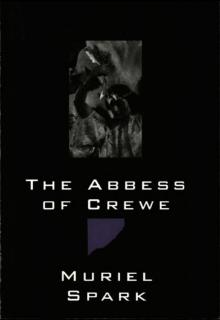 The Abbess of Crewe: A Modern Morality Tale
The Abbess of Crewe: A Modern Morality Tale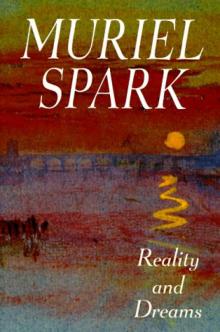 Reality and Dreams
Reality and Dreams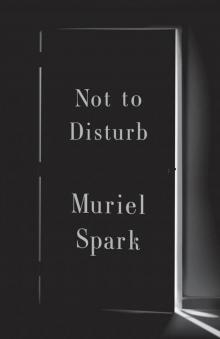 Not to Disturb
Not to Disturb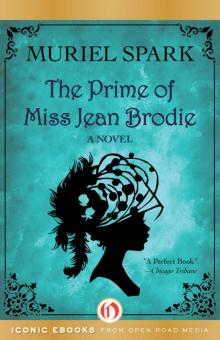 The Prime of Miss Jean Brodie
The Prime of Miss Jean Brodie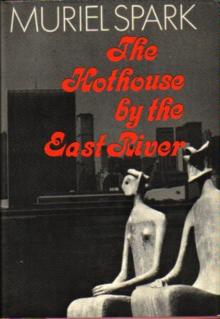 The Hothouse by the East River
The Hothouse by the East River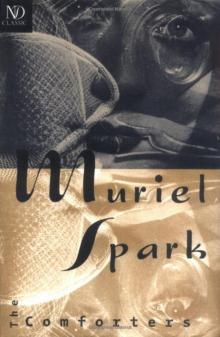 The Comforters
The Comforters (1958) Robinson
(1958) Robinson Unknown
Unknown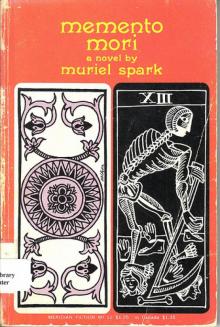 Memento Mori
Memento Mori The Finishing School
The Finishing School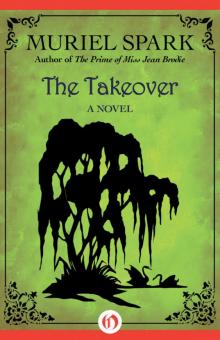 The Takeover
The Takeover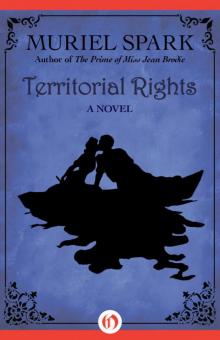 Territorial Rights
Territorial Rights The Complete Short Stories
The Complete Short Stories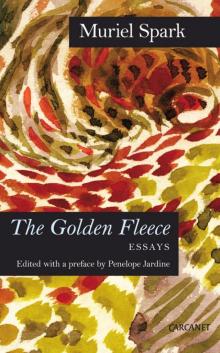 The Golden Fleece: Essays
The Golden Fleece: Essays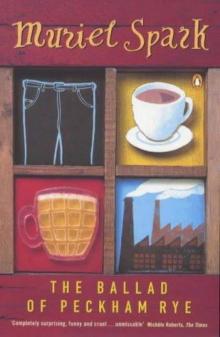 The Ballad of Peckham Rye
The Ballad of Peckham Rye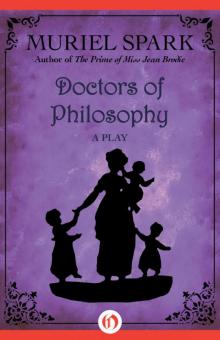 Doctors of Philosophy: A Play
Doctors of Philosophy: A Play The Mandelbaum Gate
The Mandelbaum Gate Loitering With Intent
Loitering With Intent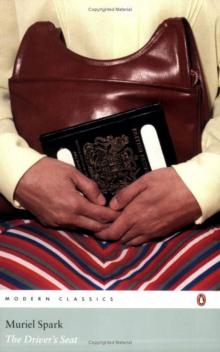 The Driver's Seat
The Driver's Seat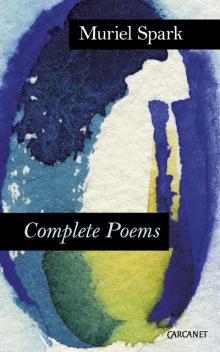 Complete Poems: Muriel Spark
Complete Poems: Muriel Spark Symposium
Symposium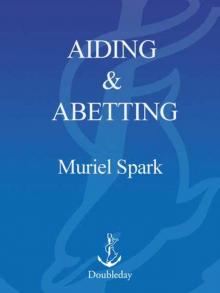 Aiding and Abetting
Aiding and Abetting The Golden Fleece
The Golden Fleece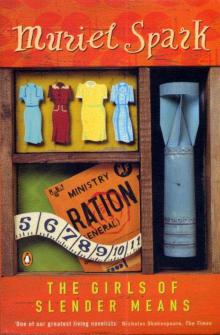 The Girls of Slender Means
The Girls of Slender Means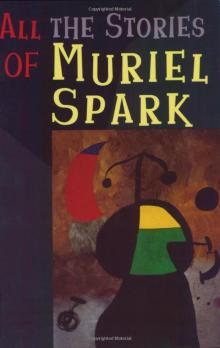 Alice Long’s Dachshunds
Alice Long’s Dachshunds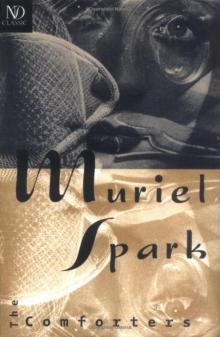 (1954) The Comforters
(1954) The Comforters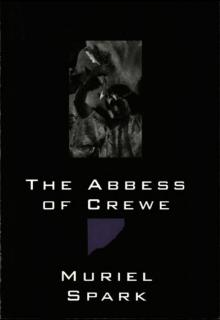 The Abbess of Crewe
The Abbess of Crewe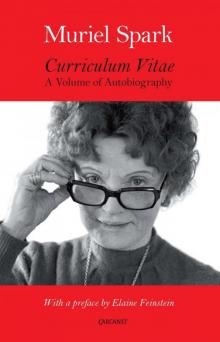 Curriculum Vitae
Curriculum Vitae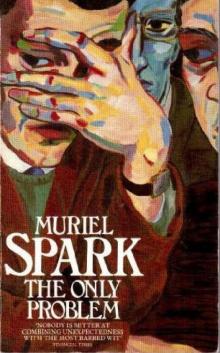 The Only Problem
The Only Problem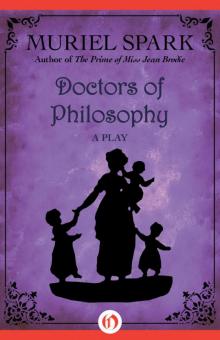 Doctors of Philosophy
Doctors of Philosophy